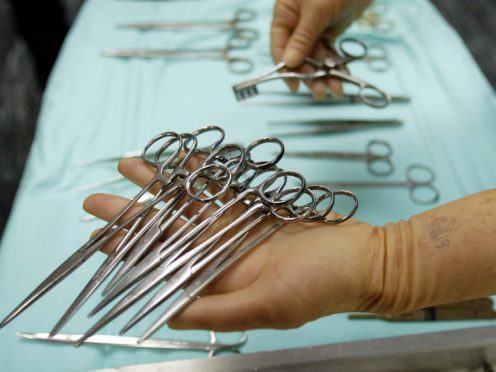Scientists believe the hallmark Alzheimer’s protein – amyloid beta – may have been passed to a small number of people during childhood brain surgery.
Researchers at University College London (UCL) studied the medical records of four people who had brain bleeds caused by amyloid beta build-up in the blood vessels of the brain, and found all four had undergone neurosurgery two or three decades earlier as children or teenagers.
They said this raises the possibility that amyloid beta deposition may be transmissible through neurosurgical instruments in a similar way to prion proteins which are implicated in prion dementias such as Creutzfeldt-Jakob disease (CJD).
The findings should factor into future reviews of sterilisation and safety practices for surgical procedures, they said.
Amyloid beta is known for being one of the hallmark proteins of Alzheimer’s disease, but the researchers did not find evidence of Alzheimer’s in this study.
The researchers looked in the pathology archive at the National Hospital for Neurology and Neurosurgery for biopsy and autopsy materials of young adult patients with confirmed amyloid beta pathology, which can lead to brain bleeds or harmful plaques in the brain’s blood vessels.
These deposits of the amyloid protein occur increasingly frequently in older individuals but only very rarely in younger people.
Four cases were identified – three of them in their 30s and one aged 57 – all of whom had experienced brain bleeds caused by amyloid deposits in brain blood vessels.
In a comparison group of 50 people of similar ages from the same archives, the researchers did not find any amyloid beta pathology and only three had a recorded history of childhood neurosurgery.
Previous work with laboratory animals has shown that tiny amounts of abnormal amyloid beta protein can stick to steel wires and transmit pathology into the animals’ brains, but this paper is the first to suggest the same may be possible in humans.
Lead author, Professor Sebastian Brandner of UCL Institute of Neurology, said: “It is well known that the abnormal proteins seen in Creutzfeldt-Jakob disease have been transmitted between patients by certain medical and surgical procedures.
“We have found new evidence that amyloid beta pathology may be transmissible. This does not mean that Alzheimer’s disease can be transmitted, as we did not find any significant amount of pathological tau protein which is the other hallmark protein of Alzheimer’s disease.
“Our findings relate to neurosurgical procedures done a long time ago. Nevertheless, the possibility of pathological protein transmission, while rare, should factor into reviews of sterilisation and safety practices for surgical procedures.”
The study is published in the journal Acta Neuropathologica.
Dr David Reynolds, chief scientific officer at Alzheimer’s Research UK, said: “While it is too early to draw any firm conclusions from such a small study, the finding that people with a rare amyloid-related disease all had brain operations early in life raises the possibility of amyloid having been passed from one person to another during neurosurgery.
“Any potential link will need to be explored in much larger studies, but it is important to remember that people receive vital and often life-saving brain surgery every day in the UK and any potential risk of disease from these procedures is minimal.
“This study didn’t look at whether those who underwent neurosurgery in childhood went on to develop Alzheimer’s disease and there is currently no evidence that Alzheimer’s can be transmitted through brain surgery.”
